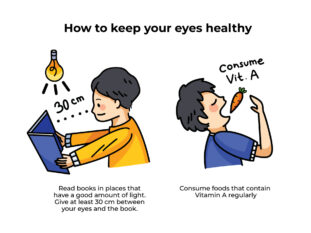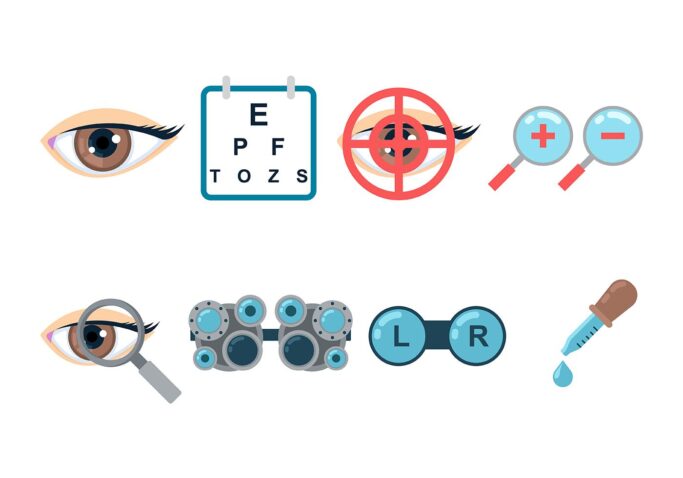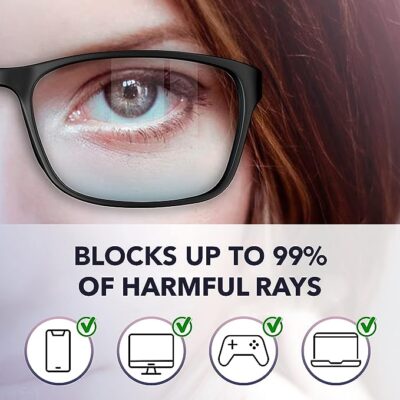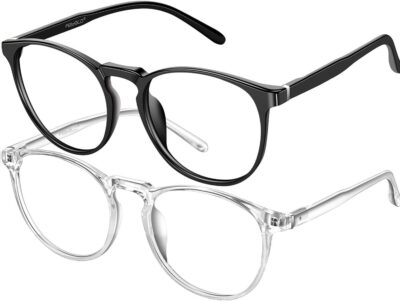Explore eye health and how to improve your vision with 9 natural remedies for eyesight. This has increasingly become important in a world dominated by screens, where we constantly find ourselves glued to smartphones, computers, and televisions.
These all subject the eyes to more stress than ever before. Good eyesight is a precious asset, and you must take steps to protect and enhance it as you age to enjoy the use of those eyes in your twilight years.
Yet, for many, deteriorating eyesight is an inevitable consequence of aging, excessive screen time, or environmental factors. The good news is that there are natural ways to enhance your vision, and lifestyle changes that can slow down, prevent, and even reverse the decline in eyesight.
Whether you are already struggling with vision problems or simply want to maintain your eyesight in top form, this article is your guide to taking control of youreye health.
How the Eyes Work
By understanding how your eyes work and what factors can impact them, better equips you to explore ways to achieve better vision.
The eyes function like a complex camera system, capturing and processing images and sending them to the b brain for interpretation.
When light enters the eye, it passes through the cornea and the lens. The cornea is the clear front surface of the eye, and the lens helps to focus the light onto the retina.
The retina, located at the back of the eye, contains millions of tiny light-sensitive cells called photoreceptors. These photoreceptors come in two types: rods and cones. Rods help you see in dim light, while cones are responsible for color vision.
Once the retina captures an image, it converts it into electrical signals and sends them through the optic nerve to the brain which then processes these signals into the images you perceive.
Common Vision Problems
Here are four of the most prevalent vision issues:
Myopia (Nearsightedness): Occurs when the eyeball is too long or the cornea is too curved, causing distant objects to appear blurry.
Hyperopia (Farsightedness): Hyperopia is the opposite of myopia. It occurs when the eyeball is too short, making close-up objects appear blurry.
Astigmatism: Results from an irregularly shaped cornea or lens, causing distorted and blurred vision at any distance.
Presbyopia: This is an age-related condition where the eye’s lens loses flexibility, making it challenging to focus on close-up objects.
Factors Contributing to Poor Eyesight
Several factors can contribute to deteriorating eyesight. These include:
Genetics: Family history plays a significant role in determining your susceptibility to certain vision problems.
Lifestyle: Prolonged exposure to digital screens, inadequate sleep, a poor diet, and sedentary habits can all affect your eyesight.
Environmental Factors: Exposure to ultraviolet (UV) rays from the sun, excessive screen glare, and blue light from electronic devices can strain your eyes.
Aging: As we age, changes in the eye’s structure can lead to presbyopia, cataracts, and other age-related vision issues.
You cannot change your genetic makup and the aging processes, but you certainly can make changes to your lifestyle and environmental factors that can affect vision.
Lifestyle Changes to Enhance Your Eyesight
Diet and nutrition, hydration, sleep and physical exercises are ways to naturally maintain and improve vision.
Diet and Nutrition

What you eat plays a key role in your overall health, including the health of your eyes. Incorporating certain nutrients into your diet can promote good eyesight and prevent vision problems.
Foods Rich in Essential Eye Nutrients
- Vitamin A: Essential for maintaining good vision, vitamin A can be found in foods like carrots, sweet potatoes, and spinach.
- Vitamin C: Supports blood vessels in the eyes and is abundant in citrus fruits, bell peppers, and strawberries.
- Vitamin E: An antioxidant that helps protect the eyes from free radical damage, found in nuts, seeds, and leafy greens.
- Lutein and Zeaxanthin: These compounds filter harmful high-energy light waves and can be found in leafy greens, eggs, and broccoli.
Antioxidants and Omega-3 Fatty Acids
- Antioxidants like beta-carotene and lutein can protect your eyes from oxidative stress.
- Omega-3 fatty acids found in fish (such as salmon and trout) can help reduce the risk of dry eyes and age-related macular degeneration, and enhance your eyesight.
Enhace Your Eyesight with Hydration
Proper hydration is important for eye health. Dehydration can lead to dry eyes, which can cause discomfort and vision disturbances. Make sure you drink enough water throughout the day to keep your eyes adequately moistened.
Sleep
Quality sleep is essential for overall health, and it also directly impacts your eyesight. During sleep, your eyes have a chance to rest and recover.
Inadequate or poor-quality sleep can lead to eye strain and discomfort. Try to get 7-9 hours of restful sleep every night to promote healthy eyes.
Exercise
Regular physical activity can have a positive impact on your eye health. Exercise improves blood circulation, which, in turn, enhances oxygen and nutrient delivery to the eyes.
Physical activity also helps maintain a healthy weight, reducing the risk of conditions like diabetes, which can harm your vision.
Incorporating these lifestyle changes into your daily routine can go a long way to naturally enhance your eyesight. The journey to crystal clear vision is a combination of these lifestyle changes and proactive steps to care for your eyes.
Ways to Achieve Better Vision – Protect Your Eyes from Environmental Stressors
Your eyes are continually exposed to various environmental factors that can impact their health.
Taking steps to shield them from harm is an essential part of maintaining good eyesight and one of the natural ways to achieve better vision.
UV Protection and Sunglasses
Exposure to ultraviolet (UV) rays from the sun can lead to eye damage, including cataracts and macular degeneration.
To protect your eyes, wear sunglasses that provide 100% UV protection with labels that specify UVA and UVB protection.
Wearing sunglasses with a wide-brimmed hat can offer additional protection and reduce the amount of UV light that reaches your eyes.
Reduce Screen Glare and Blue Light Exposure
Use screen filters on your electronic devices to reduce glare and minimize the amount of blue light emitted from screens.
Invest in blue light-blocking glasses, especially if you spend extended periods in front of digital screens.
These glasses can help reduce eye strain and protect your eyes from harmful blue light.
Many devices and computers now offer blue light reduction software or apps that can be scheduled to activate during evening hours to help reduce exposure to disruptive blue light before bedtime.
Habits, Natural Remedies and Exercises to Enhance Your Eyesight
When it comes to improving your vision naturally, there are practices, remedies and exercises that can help enhance your eyesight, alleviate eye strain, and support eye health.
While these eye-friendly practices may not work overnight, consistent application tend to yield positive results over time.
These practices are especially relevant in our modern digital age, where we spend hours in front of screens and under various types of artificial lighting.
1. Regular Eye Exams
Even if your vision seems fine, regular eye exams are necessary to maintain good eyesight.
Comprehensive eye exams can detect early signs of eye conditions and diseases, such as glaucoma, cataracts, and macular degeneration, which may not present noticeable symptoms until they are in the advanced stages.
2. Eye-Friendly Habits
By adopting these eye-friendly habits, you can significantly reduce the strain on your eyes and promote their long-term health.
The 20-20-20 Rule for Digital Device Users
Staring at digital screens for prolonged periods can lead to digital eye strain, also known as computer vision syndrome. To reduce this strain and give your eyes a break, follow the 20-20-20 rule:
- Every 20 minutes, take a 20-second break.
- During these breaks, focus your gaze on an object at least 20 feet away.
This simple habit can prevent eye fatigue, dryness, and discomfort.
Reduce Eye Strain in Daily Activities
Ensure your workspace or reading area is well-lit. Avoid glare on your screen or book, as it can lead to squinting and eye strain.
Maintain an ergonomic posture while using digital devices or reading. Position screens at eye level to reduce the need for constant tilting and straining.
Blink regularly to keep your eyes moist and prevent dryness. Prolonged screen time often leads to reduced blink rates.
Consider using blue light filters on your digital devices or invest in blue light-blocking glasses to reduce exposure to harmful high-energy visible (HEV) light.
3. Palming and Eye Exercises
Palming is a simple relaxation exercise that can relieve eye strain. Follow these steps: Rub your hands together vigorously to generate heat; cup your palms over your closed eyes without applying pressure; and breathe deeply and relax for a few minutes, visualizing complete darkness.
Eye Exercises can improve eye muscle flexibility and coordination. Examples include rolling your eyes in a circular motion, focusing on a nearby object, then switching to a distant one, and side-to-side and up-and-down eye movements.
4. Acupressure and Reflexology for the Eyes
Acupressure involves applying pressure to specific points on the face and around the eyes. This can stimulate blood flow and relieve tension.
Gently press the area between your eyebrows for a few seconds, and then use your thumbs to apply light pressure to the inner corners of your eyes and hold for a few seconds.
Reflexology involves massaging or applying pressure to specific points on the hands and feet that correspond to different body parts, including the eyes. For example, massaging the area under the big toe on the foot can help relieve eye strain.
5. Home Natural Remedies for Eyesight to Relieve Eye Fatigue
Warm Compress: Applying a warm compress to your closed eyes can relax eye muscles and relieve tension.
Cucumber Slices: Place chilled cucumber slices on your closed eyelids for a soothing and refreshing effect.
Rose Water: Applying a few drops of pure rose water to your eyes can help reduce redness and irritation.
Aloe Vera Gel: Aloe vera gel can provide relief for dry or irritated eyes when used sparingly. Only use gels free of added fragrances or preservatives.
While these natural remedies to improve eyesight and exercises may not be a quick fix, they can contribute to your overall eye health and comfort. Remember to be consistent and patient in your efforts.
Natural Remedies for Eyesight to Manage Stress
Stress can negatively impact your eyes, so taking proactive steps to manage it not only benefits your mental health but also contributes to maintain and enhance your eyesight.
The mind and the eyes are intricately connected, and stress can manifest physically in the eyes, leading to discomfort and vision disturbances. Here are some natural remedies to improve eyesight through managing stress.
Seek professional support if you are dealing with chronic stress. A strong support system of family and friends can help you navigate stressful situations more effectively.
1. Stress Reduction Techniques
Practicing relaxation techniques like deep breathing, meditation, and progressive muscle relaxation can help reduce overall stress levels.
Mind-body practices like Yoga and Tai Chi not only help reduce stress but also improve blood circulation, which is essential for eye health.
Mindfulness and Visualization exercises help to focus you to stay present in the moment and reduce anxiety. Visualization techniques can also help you envision a calm, stress-free environment.
2. Adequate Sleep
Quality sleep is essential for stress management and overall well-being. Lack of sleep can lead to eye strain, redness, and fatigue. Ensure you establish a regular sleep routine and create a comfortable sleeping environment.
3. Manage Workload and Time
Balancing your workload and personal life is important for stress management. Avoid overextending yourself, set realistic goals, and manage your time efficiently to reduce the stress associated with tight deadlines and excessive work hours.
4. Digital Detox
Take breaks from digital devices. Reducing screen time can alleviate eye strain and stress related to constant connectivity. Engage in hobbies, outdoor activities, and face-to-face interactions to disconnect from the digital world.
Conclusion – Natural Remedies for Eyesight
There are several natural remedies for eyesight maintainance and improvement. One of the ways to achieve better vision is to incorporate various practices into your daily life.
These methods may not yield immediate results, but with dedication and patience, you can experience the long-term benefits of improved vision and eye comfort.
The journey to unlocking crystal clear vision is an ongoing process, a combination of mindful choices, self-care, and an understanding of your unique eye health needs.
Related Articles:
- Eye Health in Seniors – What to Expect in Aging Adults
- How Aging Affects Vision – Best Foods for Aging Eyes
- Changes in the Body with Age. Avoid Surprise
References
American Academy of Ophthalmology (2019) Eye Health Statistics. https://www.aao.org/newsroom/eye-health-statistics#_edn1
American Academy of Ophthalmology (2019) Cataracts. https://www.nei.nih.gov/learn-about-eye-health/outreach-campaigns-and-resources/eye-health-data-and-statistics/cataract-data-and-statistics
L.G Mogk (2021) Risk Factors for Age-Related Macular Degeneration (AMD). https://visionaware.org/your-eye-condition/age-related-macular-degeneration-amd/risk-factors-for-amd/



